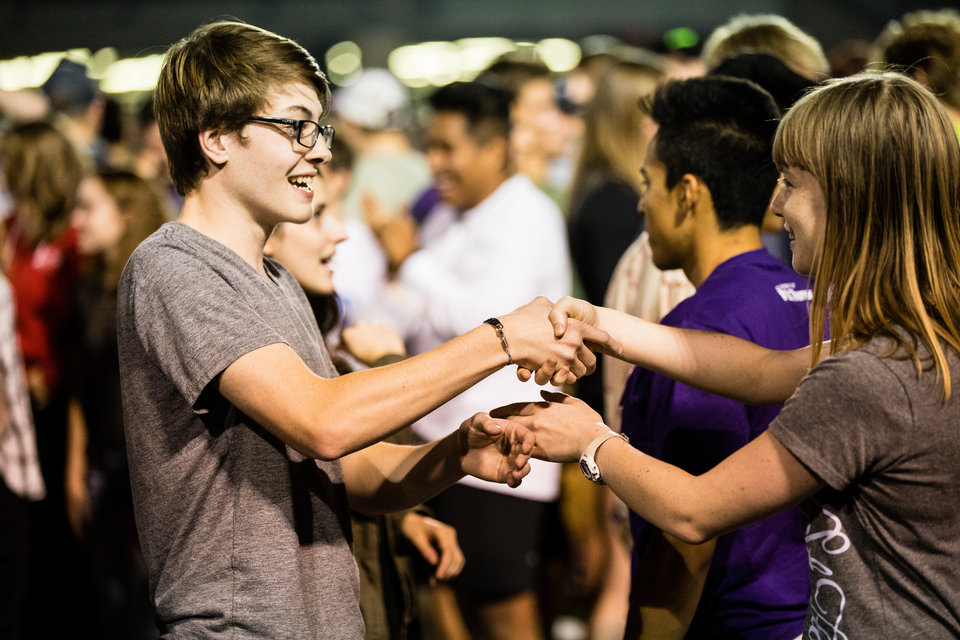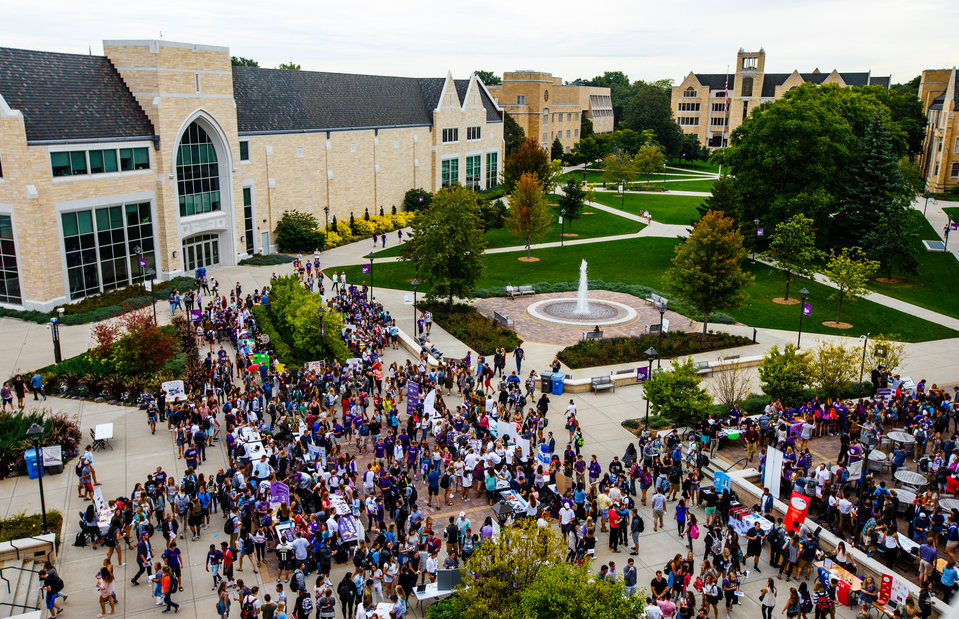On a warm August day just a couple weeks before the start of a new school year, a group of college students sat in a window nook at Izzy’s Ice Cream. As they ate ice cream, they passionately discussed how adjusting to college life can be like riding a roller coaster.
“It looks like everyone has found their people in five seconds,” said one of the students. “But that’s not really how it is. You have to put yourself out there.”
Unsurprisingly, that’s a common conversation around a college campus nearing the start of the school year. While it might seem like some people are fast to make connections, it’s normal to be caught up in a mix of emotions – excitement, anticipation, anxiousness. Navigating a new place to live, academic expectations and social life – it’s a lot to manage.
In the spring, we asked graduating St. Thomas seniors to reflect on their college experience. They offered up advice for first-year students ranging from study a lot and make goals for yourself, to take advantage of campus clubs and be open to new experiences. There is no “one-size-fits-all” college experience – it’s all about discovering what works best for you.
“It is a big, a big transition for this stage of life; whether a student is living on campus or commuting, their responsibilities and roles start to shift,” said GiGi Giordano, a psychologist with Counseling and Psychological Services. “It’s natural for some anxieties and worries to emerge, but there's a lot of excitement too. You can be excited and nervous – it doesn't mean you're going to miss out on something or miss out on part of your experience. There are worries about academics, about making a new community and building new relationships. It’s understanding that all the students are going through this to varying degrees.”
The most important thing to remember is you’re not in it alone. St. Thomas offers many resources along the course of your college journey including at the beginning.
"Transitioning to college takes time," said Dr. Karen Lange, vice president for Student Affairs. "We have so many resources on campus to help ease the transition. There are also many upper-class students who serve as mentors to our first-year students. They went through many of the same experiences when they first came to campus."
Here are some things to consider during your transition to St. Thomas.
Make new connections

Students participate in an ice breaking exercise during the Great Tommie Get Together on Palmer Field in O'Shaughnessy Stadium in St. Paul on August 1, 2017.
Even before attending classes, there’s an opportunity to make new connections. Whether it’s asking a neighbor to take a walk or sitting next to a someone you don’t know at lunch, there are a variety of ways to interact with potential new friends. Welcome Days (Aug. 30-Sept. 3) is a prime time to explore the campus, learn how it feels to be a Tommie and meet other first-year students.
Another stellar option is to explore the more than 140 clubs and organizations St. Thomas has to offer. You can find events through Tommie Link or go check out the Activities Fair on Sept. 17. Hosted by Campus Life, students will have an opportunity at the fair to meet representatives from many of the different campus clubs from noon-1 p.m. on John P. Monahan Plaza. Here you'll also meet many upper-class students and hear about their experiences with campus clubs and activities.
“The clubs provide a shared interest,” said Margaret Cahill, director of Campus Life. “That interest is what brings you together, but it provides a laid-back social setting to just engage with other students. I can remember meeting some of our greatest student leaders when they were first-year students."
“College is a great time to start over,” Cahill continued. “You didn’t have to be involved in clubs before to join clubs in college. You do not have to have been in a sport to do intramural sports … College is a time to try new things and explore different interests. We've got over 140 clubs. If there's something you're interested in that you don't see, come talk to us. That's how clubs get started."
Get to know your professors
Besides attending all your classes, making sure you understand the syllabus for each one and making a reading/studying schedule, it’s also a terrific idea to take advantage of a professor’s office hours, even if you don’t have a specific concern or questions. You’ll be able to discuss the course material one on one, get to know your professor without the constraints of a classroom and possibly make a connection that will last far beyond the semester.

Justice and Peace Studies faculty Amy Finnegan (left) poses with student Laura Kvasnicka. Finnegan mentored Kvasnicka after Kvasnicka approached Finnegan for advice about a potential research project.
Debbie Monson, an assistant professor at the School of Education who also co-teaches in mathematics and engineering, said office hours are a good time to develop relationships with a professor. She advises not to wait too long to stop in if you have questions or are becoming overwhelmed.
“I enjoy getting to know my students. That’s the teacher in me,” Monson said. “It’s really difficult to teach without a relationship with students, so I like that opportunity to get to know them. I’ve often had the privilege of having students in more than one course, so building that relationship early is key.”
Work on time management
This is a biggie. Think of it like a budget, but instead of money you’re dealing with something even more valuable – your time. In high school, a good chunk of academic time is built into the school day. College – no surprise – is much different; now you’re in charge of keeping yourself on track. Academic Counseling has some great resources for creating study schedules and managing your time. The office also offers one-on-one appointments for study skills assistance.
Creating an overall routine is key to making your experience successful. Carving out time for everything that’s important to you might require some juggling, so having a plan is vital.
“When we're doing time management and planning for the future of a week, a month or a semester, it can seem really big and overwhelming,” Giordano said. “I often try to frame it in the way of setting up schedules for living within the hour. Every hour you have a job. Sometimes your job is going to be taking a shower or it's going to be hanging out with friends. You will have hours for school – studying, academic responsibilities. Instead of thinking of it as, 'I have all these responsibilities for the whole semester,' take it hour by hour and try to minimize that mountain.”
Practice self-care
Self-care – you’ve probably heard that phrase a lot lately when the subject turns to health. What it boils down to is being mindful about your mental, physical and emotional well-being. It can be easy to ignore what your body needs, especially during times of stress, but don’t. An emphasis on self-care is vital when it comes to navigating the emotions that come with college transition and life in general.

Runners in Pac-Man costumes head down Summit Avenue during the homecoming Wellness Center 5k.
“Know that as exciting as the first year, first month, first week, first days are, there can also be a sense of loss,” Birdie Cunningham, associate director of Health and Wellness, said. “This is a big change. You are leaving a lot behind. Leaving your friends, family pet, family, your home if you're living on campus. If you are commuting, you are needing to navigate a whole new environment … it's a lot of change. There will be a sense of loss and that's normal. You can hold excitement, nervousness, stress, loss, grief and feeling overwhelmed all at the same time. Be kind to yourself and practice good self-care – sleep, nutrition, downtime, physical activity, spiritual time.”
Along with making self-care part of your daily routine, Giordano suggests having a plan for those challenging days.
“Focus on self-care plans. Maintenance self-care – what are the things I do every day to make sure I’m taking care of myself,” Giordano said. “But also ask, ‘What do I do on a really difficult day?’ Being really attuned with the physical, emotional, spiritual and relational ways I feed rejuvenated. On days that are tough and hard, it’s helpful to have those written out somewhere before it gets to be an issue.”
For those who’d like more guidance in this area, Pathways to a Better You is a workshop series run by counselors from Counseling and Psychological Services. It’s open to all students interested in learning strategies for coping with everyday stressors, especially where college is concerned.







